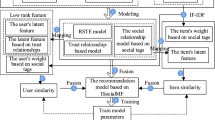Abstract
Recommender systems try to propose a list of main interests of an on line social network user based on his predicted rating values. In the recent years, several methods are proposed such as Interest Social Recommendation method (ISoRec), and Social Recommendation method based on trust Sequence Matrix Factorization which employs matrix factorization techniques to address the trust propagation and sequential behaviors issues. Main drawback of these works is that they ignore implicit interest of users. Therefore, the main goal of this paper is to solve user-item rating based on the trust, sequential interest and the implicit interest of users, simultaneously. In order to solve this problem, our proposed method combines these parameters as its inputs. This method based on matrix factorization named as ISoTrustSeq. Experimental results show higher accuracy of predicted values in compared to the above-mentioned methods. Our results are also much better than these methods in terms of variation in the number of user-items features.



















Similar content being viewed by others
References
Bobadilla, J., Ortega, F., Hernando, A., Gutiérrez, A. (2013). Recommender systems survey. Knowledge-Based Systems, 46, 109–132. Elsevier B.V.
Bottou, L. (2010). Large-scale machine learning with stochastic gradient descent. In Proceedings of the International Conference on Computer Statistics.
Ford, J., Makedon, F., Pearlman, J. (2005). Using singular value decomposition approximation for collaborative filtering. In 7th IEEE International Conference on E-Commerce Technology (pp. 257–264).
Han, J., Kamber, M., Pei, J. (2006). Data mining – consepts and techniques, edition S. San Francisco: Morgan Kaufmann of Elsevier.
Hofmann, T. (2003). Collaborative filtering via gaussian probabilistic latent semantic analysis. In Proceedings of the 26th Annual International ACM SIGIR Conference on Research and Development Informaion Retrieval (pp. 259–266).
Jamali, M. (2010). A Matrix Factorization Technique with Trust Propagation for Recommendation in Social Networks Categories and Subject Descriptors. In The fourth ACM conference on Recommender systems. no. 978–1–60558–906–0 (pp. 135–142).
Kadie, C., Breese, J.S., Heckerman, D. (1998). Empirical analysis of predictive algorithms for collaborative filtering. In UAI-Fourteenth conference on Uncertainty in artificial intelligence (pp. 43–52).
Kannan, R., Ishteva, M., Park, H. (2013). Bounded matrix factorization for recommender system. Knowledge Information Systems, 39(3), 491–511.
Koren, Y., Bell, R., Volinsky, C. (2009). Matrix factorization techniques for recommender systems. Computer (Long Beach California), 42(8), 30–37.
Li, B., Tian, B.-B., Liu, J. (2015). A Novel Probabilistic Matrix Factorization Recommendation Algorithm Using Social Reliable Similarity Propagation. Intelligence Computing Theory Methodology, 9226, 80–91.
Ma, H., Yang, H., Lyu, M.R., King, I. (2008). S o R e c: Social recommendation using probabilistic matrix factorization. In Proceeding of the 17th ACM Conference on Information Knowledge Management vol. 08 (pp. 0–9).
Ma, H., King, I., Lyu, M.R. (2011). Learning to Recommend with Social Trust Ensemble. In SIGIR ’09 Proceedings of the 32nd International ACM SIGIR Conference (pp. 203–210).
Ma, H., Zhou, D., Liu, C., Lyu, M.R. (2011). Recommender systems with social regularization. In Proceedings of the fourth ACM International Conference on Web Search Data Mining, no. 978–1–4503–0493–1 (pp. 287–296).
Matuszyk, P., Vinagre, J., Spiliopoulou, M., Jorge, A. M., Gama, J. (2015). Forgetting methods for incremental matrix factorization in recommender systems. In Proceedings of the 30th Annual ACM Symposium on Applied Computing - SAC ’15 (pp. 947–953).
Oh, J., & Han, W. (2015). Fast and robust parallel SGD matrix factorization. In KDD ’15 Proceedings of the 21th ACM SIGKDD, The International Conference on Knowledge Discovery and Data Mining (pp. 865–874).
Qian, X., Feng, H., Zhao, G., Mei, T., Member, S. (2014). Personalized recommendation combining user interest and social circle. IEEE Transactions on Knowledge and Data Engineering, 26(7), 1763–1777.
Rana, C., & Jain, S.K. (2014). An evolutionary clustering algorithm based on temporal features for dynamic recommender systems. Swarm and Evolutionary Computation, 14, 21–30.
Recht, R.C.B. (2013). Parallel stochastic gradient algorithms for large-scale matrix completion. Mathematical Programming Computation, 5, 201–226.
Salakhutdinov, R., & Mnih, A. (2008). Probabilistic matrix factorization. Neural Information Processing System, 1–8.
Su, X., & Khoshgoftaar, T.M. (2009). A survey of collaborative filtering techniques. Advances in Artificial Intelligence, 2009(3), 1–19.
Way, O.M. (2013). An Experimental Study on Implicit Social Recommendation. In 36th international ACM SIGIR conference on Research and development in information retrieval (pp. 73–82).
Wu, L., Chen, E., Liu, Q., Xu, L., Bao, T., Zhang, L. (2012). Leveraging tagging for neighborhood-aware probabilistic matrix factorization. In 21st ACM international conference on Information and knowledge management (pp. 1854–1858).
Yang, X., Member, S., Guo, Y., Liu, Y. (2013). Bayesian-inference-based recommendation in online social networks. IEEE Transactions on Parallel and Distributed Systems, 24(4), 642–651.
Yang, X., Guo, Y., Liu, Y., Steck, H. (2014). A survey of collaborative filtering based social recommender systems. Computer Communications, 41, 1–10.
Yu, H.-F., Hsieh, C.-J., Si, S., Dhillon, I.S. (2013). Parallel matrix factorization for recommender systems. Knowledge Information Systems, 41(3), 793–819.
Yu-sheng, L.I., Mei-na, S., Jun-de, S. (2014). Social recommendation algorithm fusing user interest social network. The Journal of China Universities of Posts and Telecommunications, 21, 26–33.
Zhang, Z., & Liu, H. (2014). Application and research of improved probability matrix factorization techniques in collaborative filtering. International Journal of Control, Automation and Systems, 7(8), 79–92.
Zhang, Z., & Liu, H. (2015). Social recommendation model combining trust propagation and sequential behaviors. Applied Intelligence, 43(3), 695–706.
Zhang, C., Zhang, Z., Yu, L., Liu, C., Liu, H. (2013). Information filtering via collaborative user clustering modeling. Physica A, 396, 195–203.
Zhang, Y., Chen, M., Huang, D., Wu, D., Li, Y. (2016). iDoctor: Personalized and professionalized medical recommendations based on hybrid matrix factorization, Future Generation Computer Systems, p. In Press.
Author information
Authors and Affiliations
Corresponding author
Rights and permissions
About this article
Cite this article
Nobahari, V., Jalali, M. & Seyyed Mahdavi, S. ISoTrustSeq: a social recommender system based on implicit interest, trust and sequential behaviors of users using matrix factorization. J Intell Inf Syst 52, 239–268 (2019). https://doi.org/10.1007/s10844-018-0513-8
Received:
Revised:
Accepted:
Published:
Issue Date:
DOI: https://doi.org/10.1007/s10844-018-0513-8




